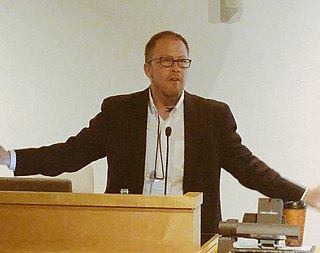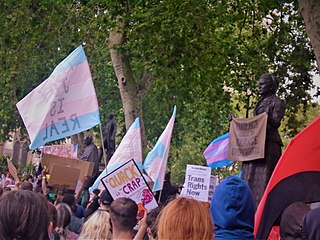The legal status of transgender people varies greatly around the world. Some countries have enacted laws protecting the rights of transgender individuals, but others have criminalized their gender identity or expression. In many cases, transgender individuals face discrimination in employment, housing, healthcare, and other areas of life.
The word cisgender describes a person whose gender identity corresponds to their sex assigned at birth, i.e., someone who is not transgender. The prefix cis- is Latin and means on this side of. The term cisgender was coined in 1994 as an antonym to transgender, and entered into dictionaries starting in 2015 as a result of changes in social discourse about gender. The term has been and continues to be controversial and subject to critique.

Transphobia consists of negative attitudes, feelings, or actions towards transgender people or transness in general. Transphobia can include fear, aversion, hatred, violence or anger towards people who do not conform to social gender roles. Transphobia is a type of prejudice and discrimination, similar to racism, sexism, or ableism, and it is closely associated with homophobia. People of color who are transgender experience discrimination above and beyond that which can be explained as a simple combination of transphobia and racism.
Heteronormativity is the concept that heterosexuality is the preferred or normal sexual orientation. It assumes the gender binary and that sexual and marital relations are most fitting between people of opposite sex.
Gender transition is the process of affirming and expressing one's internal sense of gender, rather than the gender assigned to them at birth. It is the recommended course of treatment for individuals struggling with gender dysphoria, providing improved mental health outcomes in the majority of people.

Sexual attraction to transgender people has been the subject of scientific study and social commentary. Psychologists have researched sexual attraction toward trans women, trans men, cross dressers, non-binary people, and a combination of these. Publications in the field of transgender studies have investigated the attraction transgender individuals can feel for each other. The people who feel this attraction to transgender people name their attraction in different ways.

A transgender person is someone whose gender identity differs from that typically associated with the sex they were assigned at birth. Some transgender people who desire medical assistance to transition from one sex to another identify as transsexual. Transgender can function as an umbrella term; in addition to including binary trans men and trans women, it may also include people who are non-binary or genderqueer. Other definitions of transgender also include people who belong to a third gender, conceptualize transgender people as a third gender, or conflate the two concepts. The term may also include cross-dressers or drag kings and drag queens in some contexts. The term transgender does not have a universally accepted definition, including among researchers.

Paisley Currah is political scientist and author, known for his work on the transgender rights movement. His book, Sex Is as Sex Does: Governing Transgender Identity examines the politics of sex classification in the United States. He is a professor of political science and women's and gender studies at Brooklyn College and the Graduate Center of the City University of New York. He was born in Ontario, Canada, received a B.A. from Queen's University at Kingston, Ontario and an M.A and Ph.D. in government from Cornell University. He lives in Brooklyn.
Feminist views on transgender topics vary widely.
Transgender studies, also called trans studies or trans* studies, is an interdisciplinary field of academic research dedicated to the study of gender identity, gender expression, and gender embodiment, as well as to the study of various issues of relevance to transgender and gender variant populations. Interdisciplinary subfields of transgender studies include applied transgender studies, transgender history, transgender literature, transgender media studies, transgender anthropology and archaeology, transgender psychology, and transgender health. The research theories within transgender studies focus on cultural presentations, political movements, social organizations and the lived experience of various forms of gender nonconformity. The discipline emerged in the early 1990s in close connection to queer theory. Non-transgender-identified peoples are often also included under the "trans" umbrella for transgender studies, such as intersex people, crossdressers, drag artists, third gender individuals, and genderqueer people.
Transgender inequality is the unequal protection received by transgender people in work, school, and society in general. Transgender people regularly face transphobic harassment. Ultimately, one of the largest reasons that transgender people face inequality is due to a lack of public understanding of transgender people.
The participation of transgender people in competitive sports, a traditionally sex-segregated institution, is a controversial issue, particularly the inclusion of transgender women and girls in women's sports.

Multiple countries legally recognize non-binary or third gender classifications. These classifications are typically based on a person's gender identity. In some countries, such classifications may only be available to intersex people, born with sex characteristics that "do not fit the typical definitions for male or female bodies."

Transgender rights in the United Kingdom have varied significantly over time.

Sexual assault of LGBT people, also known as sexual and gender minorities (SGM), is a form of violence that occurs within the LGBT community. While sexual assault and other forms of interpersonal violence can occur in all forms of relationships, it is found that sexual minorities experience it at rates that are equal to or higher than their heterosexual counterparts. There is a lack of research on this specific problem for the LGBT population as a whole, but there does exist a substantial amount of research on college LGBT students who have experienced sexual assault and sexual harassment.
Homonormativity is the adoption of heteronormative ideals and constructs onto LGBT culture and identity. It is predicated on the assumption that the norms and values of heterosexuality should be replicated and performed among homosexual people. Those who assert this theory claim homonormativity selectively privileges cisgender homosexuality as worthy of social acceptance.

Gender self-identification or gender self-determination is the concept that a person's legal sex or gender is determined by their gender identity without any medical requirements, such as via statutory declaration.
Florence Ashley is a Canadian academic, activist and law professor at the University of Alberta. They specialize in trans law and bioethics. They have numerous academic publications, including a book on the law and policy of banning transgender conversion practices. Florence served as the first openly transfeminine clerk at the Supreme Court of Canada. They are a winner of the Canadian Bar Association SOGIC Hero Award.
Cisnormativity or cissexual assumption is the assumption that everyone is, or ought to be, cisgender. The term can further refer to a wider range of presumptions about gender assignment, such as the presumption of a gender binary, or expectations of conformity to gender roles even when transgender identities are otherwise acknowledged. Cisnormativity is a form of cisgenderism, an ideology which promotes various normative ideas about gender, to the invalidation of individuals' own gender identities, analogous to heterosexism or ableism.
Alan Pelaez Lopez explains how writing ‘trans*’ shifts the power perspective of studying transgender and gender theory. They posit that writing “Trans” rather than “trans*” centers a Western academic perspective to create a genealogy of transness that fits within hegemonic frameworks of power. “trans*”, as Lopez describes, recenters gender expansive people to allow them to express their experience while remaining detached from hegemonic epistemologies of evidence.








